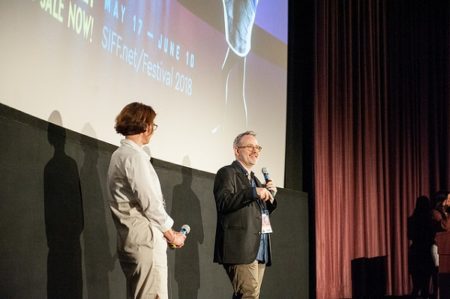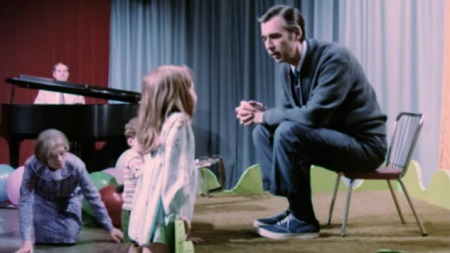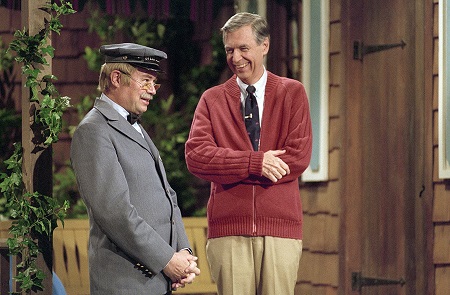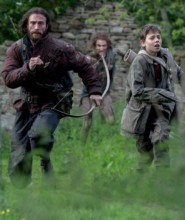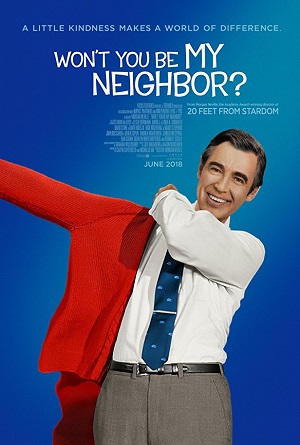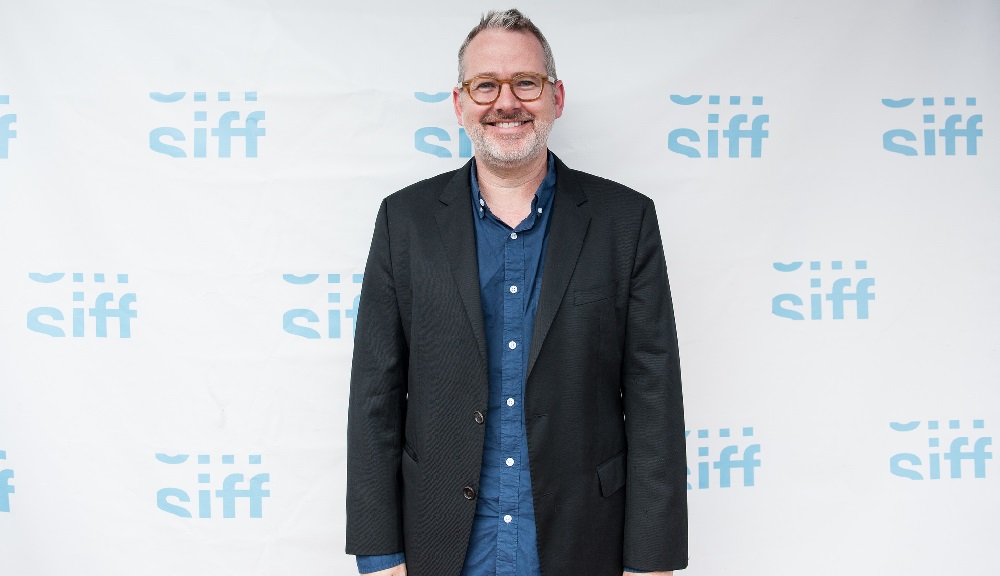
“Won’t You Be My Neighbor?” – Interview with Morgan Neville
by Sara Michelle Fetters - June 15th, 2018 - Film Festivals Interviews
a SIFF 2018 interview
A Neighborhood of Kindness
Director Morgan Neville on His Fred Rogers Documentary Won’t You Be My Neighbor?
Winner of the Golden Space Needle Award at this year’s Seattle International Film Festival for Best Documentary, Morgan Neville’s (20 Feet from Stardom) heartwarming, unabashedly emotional Won’t You Be My Neighbor? is maybe the motion picture we all need right at this very moment in history. An examination of the life and legacy of “Mr. Rogers’ Neighborhood” creator and star Fred Rogers, the movie is an insightful marvel that radiates tolerance and understanding. More than that, it is a film that asks people to remember just how far a little kindness can go, asking the viewer to reconnect with the innate goodness that sits there inside of them as they attempt to navigate through all of the various ups, downs, tragedies and triumphs life can oftentimes throw our way.
During his stop in Seattle to attend the festival I had the opportunity to sit down with Neville to talk about his latest documentary. Here are some of the highlights from our conversation:
Sara Michelle Fetters: And here we are again back at SIFF. How does it feel to be back in Seattle?
Morgan Neville: Terrific. I love Seattle. We’ve had a lot of success here. But I’m admittedly tired. I go to bed too late. Lots of balls in the air right now. I get up way too early and have a lot of work to do, both here and back at home.
Sara Michelle Fetters: Probably already all involved in your next project while you’re having to go around the country talking about this one, I imagine?
Morgan Neville: My project after my next project, actually. [laughs] I’ve already finished my next project. Being an independent filmmaker, it’s all about the hustle.
Sara Michelle Fetters: Even with an Oscar for 20 Feet of Stardom under your belt?
Morgan Neville: It’s easier. It’s definitely easier. It’s easier to get stuff made. But I still have my residual hustle from being a filmmaker for 25 years. I want to do everything. I’m always too busy. [laughs]
Sara Michelle Fetters: And here you are having just made a film about a man, Fred Rogers, who was maybe the hardest working man in television?
Morgan Neville: Exactly. He was the good kind of being “too busy.” I think that’s safe to say. As you would hope, making a film about Fred Rogers was like a chance to live in his world for a year, because you live in that head space, everybody working on the film did. We were all in this “kindness” bubble for all 2017. It was the best place I could have spent 2017, working on this film. It was like this place we went to where everybody was kind and empathetic and we all looked out for each other. We all had a smile on our face working. I didn’t want to leave.
Sara Michelle Fetters: What was the initial impetus that made you say, I need to make a movie about Fred Rogers?
Morgan Neville: I was watching his speeches. Somehow, watching these speeches he gave to Congress on YouTube, I just instinctively felt like I needed more of this voice in our culture. It wasn’t just that I wanted to revisit a voice from my childhood, it was that the stuff Fred talked about felt urgently needed in our culture, that there’s nobody else saying the things he was saying. I felt like having a grownup, empathetic voice whose looking out for the long-term well-being of our neighborhood was something I needed. I don’t hear other people talking like that. Not in our politics. Not in our media.
He’s also unique in that he supersedes any sense of labels because everybody watched “Mr. Rogers’ Neighborhood.” We didn’t watch him as a democrat or republican, as a Christian or a Jew. It was as an unformed human. As a child. He was trying to figure out how we treat each other and how we treat ourselves. He helped teach us basic principles of how to live together, that’s what it is. Here are the rules of the neighborhood. No go out there and live.
And Fred pulled from everywhere! Not only from his own Christian theology, but he also studied all religions. What are the basic humanist ideas that we should all abide by? That was a question he was asking. What he talked about was essentially aspiring to a state of grace by which he means, without getting too theological here, and not really the idea of the undeserved goodness bestowed upon you by God, but instead the idea that essentially we do good to other people not because they deserve it, and not because we get something back, but just to do good for other people. It was that simple. That’s grace.
Imagine if everybody did that? We would end up in a virtuous circle where we have a healthy society. Instead it often feel like we’re in a vicious circle these days filled with resentment and fear. Because of that Fred’s is a voice that should be a part of the conversation today. In a weird way, many people have said this to me that this the most contemporary film I’ve made even though Fred Rogers first went on television 50 years ago. Crazy, right?
Sara Michelle Fetters: Admittedly, you can’t sit in the theater and not realize that, not have the parallels to what’s going on right now slap you across the face a little bit.
Morgan Neville: Yeah. I even pulled it back because it was so heavy-handed at times, those parallels, but they’re practically inescapable.
Sara Michelle Fetters: When did you know going through all of this footage and looking through Fred’s archives that you had a motion picture?
Morgan Neville: I knew that early on. The moment I knew I wanted to make the film, which is the moment where I felt like there was enough to make a film, was when I began to wonder if Fred’s words and deeds could resonate with today’s audiences. I was actually insecure about making this film in the beginning. Can a serious documentary filmmaker make a serious film about a person who is often thought of as a punch line? Can a serious documentary be made about a man who tried to teach the world how to be kind to one another? I asked my wife about it, and she thought it was a great idea. But then, she’s a children’s librarian, so she’s a little biased. [laughs]
But as I did talk to people I kept getting positive feedback. They all thought it would be really interesting. Then I went to the Fred Rogers Center, and that’s when I knew this film could be made. At the Fred Rogers Center they have all of his archives and I’d read about the Bobby Kennedy episode, about the assassination episode, but I’d never seen it. It’s never been aired since that initial broadcast. I went to the center and asked to see that episode. When I watched it, I was floored. I knew then I could make this film. Everything, any insecurity I had about depth or dimension or tension, all of it was answered when I watched that episode. That was it for me. I had to make this film.
Sara Michelle Fetters: As you say, it would have been easy for the film to dip into being heavy-handed, to become preachy. You could have used this minister to preach to your audience. But somehow that doesn’t happen. We observe this man go through his life and creating this amazing thing on PBS. How difficult was it to walk that line where you do just observe and tell a story but do so without hammering the viewer over the head with everything you’re attempting to say?
Morgan Neville: There are a couple of things. The first is that it is very easy to be hagiographic in making a bio-doc and particularly if you’re making one about Mr. Rogers. It’s real easy to slip into sanctification which would have done him a disservice because Fred wasn’t good because he was anointed by God to be that way, he was good because he struggled through insecurity and doubt and mistakes and had to work really hard to be that good. I feel like understanding how human he was, that was a way of understanding how difficult the struggle of being human is.
The other thing was that Fred was somebody who never wanted to spin answers. He never wanted to be untruthful. I think what Fred always asked people for was to make up their own mind about things. To have an open mind. I feel it is both effective preaching and effective filmmaking to put it back on the audience and say, “We’re not telling you what to do; we’re just saying this is what we’ve done or what other people have done. This is how it is. Make up your own mind.” I feel like the whole ending of the film is an act of empathetic understanding. I think Fred would have appreciated that. It’s not like we asked, “What would Fred do?” or “Who is the next Fred?” We didn’t want to ask any of that. Instead, the question we ask is, “What responsibility are you going to take for the world that you live in?” I think asking that is very much a tribute to Fred.
Sara Michelle Fetters: Early on in the movie, some of this is just the time period, with how a person gets raised, but I was struck by this moment early on where he’s talking about children, and he’s talking about children on a universal level, and he suddenly says “he.” He never says “she” or “they” even though you know he’s talking about children, all children, in a universal manner. I thought that was really fascinating and a good insight into how people were raised. Even this man who thought of children as one large collective couldn’t help but traditionally gender them.
Morgan Neville: I’m glad you noticed that. Yeah. Because as great as Fred was, and as open-minded as he was, he was still maturing all the time. He might have been ahead of the curve but that doesn’t mean he wasn’t apart from the curve. It reminds me of something, it’s not even in the film, maybe I should have put it in the film, but that specifically reminds me of it because there was an episode that he said, “he,” in the show. Actually, there were a number of times where he made things gender specific in the show. Later on, years later he went back and shot inserts. He put on the same clothes and actually fixed old shows because he felt like the show still had some of those trappings of their era and so he wanted the kids watching the show to not to have it feel morally dated. The fact that he actually went and did that is remarkable.”
Sara Michelle Fetters: I had no idea. That’s incredible.
Morgan Neville: Yeah. Now you’ve got me wondering if I should have left that in there. [laughs] I guess that’s an extra for the Blu-ray.
Sara Michelle Fetters: But that’s a great thing about the show, don’t you think? I remember watching “Mr. Rogers’ Neighborhood” as a kid and I often felt like the show was growing up with me. I think one of the reasons that you could watch that show at four, at six, at eight or even at 10. When you’re 10 you’re supposed to be over these kind of shows, they’re no longer cool to watch, and yet whether you wanted to admit it to your friends or not you could still watch “Mr. Rogers’ Neighborhood” and find something of value, could be entertained.
Morgan Neville: I agree. Fred was always talking at different levels. Age four. Age 10. Heck, even age 40. If you go back and watch the shows, there’s always something there for just about everyone.
At one point, and this is just a statistic, at one point he was being watched by one in every 12 households every day. This was for a show that was for two to six year olds primarily, which meant that there were a lot of people watching the show that were not two and were not six. There was always often an adult in the room if there was a young child watching it, but I think Fred was also very conscious that the message he was sharing, as much as it was for children, it was also for adults.
I think that’s part of what has resonated with me about the film is this understanding that what Fred was trying to do with kids was to help them process and explain their fears and insecurities, help figure out how we can make the best of those things to create the best community. These are things that adults need help processing as much as kids do. In that way, the show is very therapeutic.
Sara Michelle Fetters: You’ve shown this film now at a few film festivals, and responses have been pretty glowing.
Morgan Neville: Yeah. I won’t lie. It’s been amazing.
Sara Michelle Fetters: All that being so, when the movie goes into general release in June, what do you hope audiences are talking about after they exit the theatre?
Morgan Neville: I’ve said this before, but I feel like so much of our culture gains power by appealing to our baser human instincts, dividing us and feeding our resentments. I see our politics doing that. I see our media doing that. Our economics even do that. I feel like there’s no kindness lobby. I feel like there is no one out there speaking to the value of civility. Fred Rogers is that person. At a time when those basic ideas of the social compact of how we’re supposed to live together feel threatened, Fred is a vehicle to have this conversation around remembering that those underpinnings of civility and kindness are the things that will keep our society from falling apart.
You make these films hoping they will have an impact but never knowing if they will. Who knows? But we make the film nevertheless. I feel like, even just seeing how people have responded to the film, it just makes my heart feel full, and I think in part that’s because people are hungering for a way to celebrate those things that feel endangered these days.
– Interview reprinted courtesy of the SGN in Seattle
